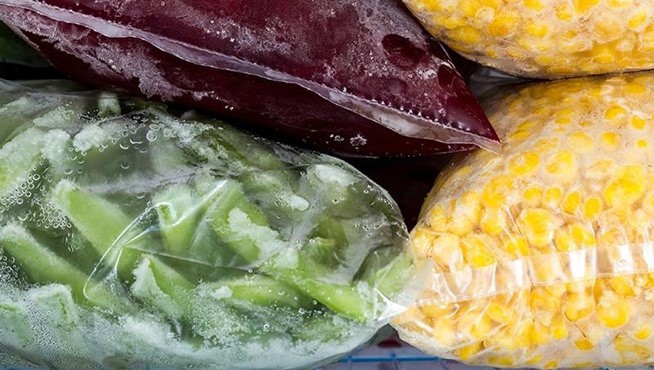The best way to extend the shelf life of your fresh fruits and vegetables is to freeze them. Freezing them in the wrong way can cause the fruits and vegetable to be saggy and bland earn the right way of freezing and retaining the flavor and nourishment.
What happens to fruits and vegetables that are frozen in the wrong way?
Have you ever noticed crystals forming around your fruit or vegetable after freezing? After you thaw your fruits and veggies the crystals melt and the produce turns mushy and dry? That is, the results of wrong freezing. This happens when fruits and vegetables are frozen and the water contents expand, and the produce start to get cellular damage.
How can you prevent this?
Freezing your produce in high cold temperature creates smaller crystals. The smaller the crystal the less cell wall damage.
Packing The Produce For Freezing:
The thing to remember about packing your produce is to have a secure and tight lid pack. Use heavy duty freezer bags or moisture proof containers. Fruits and vegetables should retain moisture and prevent air in the container. Remove as much as you can before sealing bags. Secure the seal by wrapping the lid with tape. Set the freezer temperature to its highest setting. Overloading or placing them on top of the other can cause bruising and lower temperature.
Wash your produce properly and make sure to dry them off completely. You can place them in the containers whole or cut them into small pieces. It is better for fruits and vegetables to be cut into small pieces to freeze faster.
Produce that is best packed whole
- Bananas
- Blackberries
- Chili peppers
- Tomato
- Corn
How to Freeze Fruits:
Delicate Fruits (raspberry, blueberry, etc.)
- Arrange your delicate fruits in a baking sheet, create a single layer and place in the freezer. Check after 30 minutes. If the fruits already frozen, remove from the pan and place in a freezer bag and remove as much air as you can before sealing and place in the freezer again. You can add sugar syrup in them too.
Sensitive Fruits (fruits that easily brown like apples)
- Create an ascorbic acid soak, buy powdered vitamin c or crush vitamin c tablets. Take a half teaspoon of ascorbic acid and add in 3 tablespoons of water. Sprinkle this mixture or brush on the fruits before freezing. The ascorbic acid will prevent the fruits from bruising.
Tips:
- Wash the fruit and check for damage or punctures.
- Separate the fruits you want to freeze. There are fruits that are better frozen with sugar syrup or with ascorbic acid. There are also fruits that can be dry packed.
- Prepare your sugar syrup or ascorbic acid soaks.
- Take out a sealed bag or sealed container.
How To Freeze Vegetables:
- Before freezing vegetable lightly blanch them in boiling water and then submerging them in ice cold water. Doing this will stop the vegetables from cooking further. When the vegetable turns cold remove it from the ice water and place on top of paper towels. Dry them off thoroughly before sealing in a container and heavy duty bags. Like fruits you have to remove from the container.
Why do you need to blanch before freezing?
- Blanching will prevent bacteria growth, color damage, loss nutrients and bruising.
- Freeze fruits and vegetable in their peak freshness to retain the most nutrients and taste.
Thawing The Fruits and Vegetables:
Most vegetables should be boiled as soon as they leave the freezer, except for corn thaw corn before boiling it. Delicate fruits should not be thawed completely, it will turn too mushy. So, eat them while they are still a little frozen.
Why should you consider freezing your fruits and vegetable?
Canned fruits and vegetables are easy to find and can be kept for a long period of time, but it sacrifices a lot of nutrients and quality of the produce. Freezing also gives you the liberty to pack your own mix of fruits. Freezing doesn’t cost a pretty penny either, all you need is heavy duty containers, natural preservatives and water. Seasonal fruit are great for freezing too, you can eat the fruit even when its not in season. Frozen fruits and veggies can last up to 6 to 12 months.
Tips:
- Label your fruits and vegetable, place the date too. This way you can eat the fruits that was frozen first.
- Create jams with the fruits you don’t plan to eat anymore.
- Use freezer tape instead of regular tape.
- Use a vacuum sealer to remove air from the container.
Freezing is a great way to keep your fruits and vegetables in the fridge for a long period of time. It is also a healthier alternative to canned fruits and vegetables.
